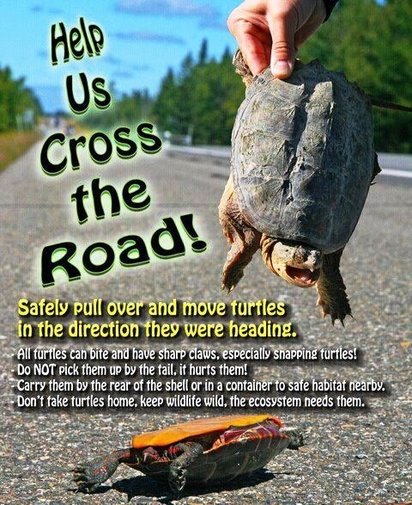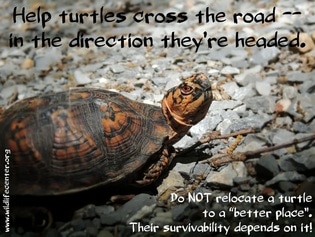|
UPDATE: Founder and Director, Christy Milbourne, is officially in REMISSION from breast cancer! We thank you all for your patience with us during this time, and we beg for a little more patience as we move forward. Chemotherapy and surgery really did a number on Christy, so she will be coming back to the world of turtle rehab very slowly. The Central Office has begun taking turtles again, but only from our immediate area. Folks to our north and west will still need to contact our northern office, and folks to our south and east will stil contact Wild at Heart Rescue for now. Contact numbers are below:
Central Mississippi Madison, Hinds, Rankin, Simpson, and Copiah Counties ONLY 601-672-1418 North and West Mississippi North of Madison County or West of Hinds County CMTR Northern Office, 662-812-7945 (Carrie Moyers) OR MS Wildlife Rehab, 662-612-6455 South and East Mississippi South of Simpson/Copiah Counties or East of Rankin County Wild at Heart Rescue, 228-669-7907 PLEASE TEXT Thank you again to everyone for your patience and for your prayers! Tough Like a Turtle!!! |
I Found a Wild Turtle. What Do I Do?
BEFORE you contact us or any other wildlife rescue, there are a few things to consider.
Not all situations require rescue. If you have found an injured turtle and have determined the turtle does require our help, click here. And if you pick up a turtle, please, please, please take note of the location where you found it. This is critical information for us and any other rescue if the turtle is able to be released once rehabilitated. We have also included a page with contact information for Other Wildlife Rescues in Mississippi that might be able to help.
When in doubt, contact us at 601-672-1418!
Not all situations require rescue. If you have found an injured turtle and have determined the turtle does require our help, click here. And if you pick up a turtle, please, please, please take note of the location where you found it. This is critical information for us and any other rescue if the turtle is able to be released once rehabilitated. We have also included a page with contact information for Other Wildlife Rescues in Mississippi that might be able to help.
When in doubt, contact us at 601-672-1418!
|
Is the turtle native to Mississippi? If you're not sure, don't hesitate to ask us. It's helpful if you take several pictures of the turtle (top, bottom, face, tail) that you can text message to us. Non-native turtles (released or escaped pets usually) do not need to be roaming the wilds of our state. If you've found a non-native turtle, we'll need to get the turtle from you even if it's not injured.
Is the turtle injured or in a dangerous location? If the answer to both of those questions is "no", and the turtle is a native species, then do nothing. The turtle will be fine. If the turtle is in a dangerous location, it's perfectly fine to move it to safety so long as you stay safe yourself in doing so. Please NEVER relocate a turtle to another area. If the turtle you found is injured, gently collect the turtle and put it in a clean, dry container in a warm but shaded area away from pets or potential predators. Do not attempt to apply any type of first aid. Give us a call, shoot us an email, or contact a qualified reptile vet in your area for assistance. See our Turtle Emergency page for more detailed information on helping an injured turtle or tortoise. Never release a turtle directly into a lake/pond unless you are absolutely positive that it is an aquatic turtle. Box turtles (that look a whole lot less "boxy" when they're babies) aren't great swimmers in general. If you mistakenly throw a box turtle or tortoise into a pond, it could drown. It's best to set a turtle down near the water, but not in it. If you see a turtle on the road, please do not take chances with your own safety. Only stop to help if you can do so safely. If you do stop, make sure the turtle is native to Mississippi, then take the turtle to the side of the road he was heading toward. (If you put him back in the direction he came from, he'll just try to cross the road again). **If the turtle is crossing a large divided highway such as an interstate, take the turtle back from the direction it came from, and place him/her as far off the road as possible.
If you found a box turtle, please keep in mind that box turtles have a "home range" - an area about the size of a football field - where he will spend his entire life. If you move it outside his home range, he will spend the rest of his life trying to get back to where his instincts tell him is home. Most turtles do not survive that journey.
|
|
PLEASE never take a wild turtle home to keep as a pet. Many of Mississippi's native turtles are facing population declines, and one of the leading reasons for this is people taking them from the wild to keep as pets. Box turtles, for example, "are long lived animals that are relatively slow in reproducing. They reach sexual maturity only after four or five (or possibly twenty!) years of life, produce relatively small numbers of eggs, and have a high hatchling mortality rate." (source, PennsState University.) In fact, a female box turtle typically takes half a century or more to produce just two offspring that survive to reproductive age. So, every single wild turtle is important in order to make sure they're still around for future generations. Also, many wild turtles don't adapt well to captivity. You may not see outward signs that your new pet turtle is in trouble, but bringing one into your home could shorten its life by decades. Let the wild turtles stay wild. If you're interested in having a pet turtle, why not adopt one that needs a home? Check out or adoptions page to learn more!
|
I Have a Pet Turtle that I Can't Keep
Unfortunately, our facility is not a sanctuary. We have very limited space, and that space is reserved for turtles who have been injured or are recovering from illness, and are undergoing rehab with us. If you've found yourself unable to care for your pet turtle:
PLEASE do not release your turtle into the wild. Once a pet, always a pet. While turtles never forget how to be turtles, ones that have been kept in captivity are at a marked disadvantage in the wild.
Pet Surrender
If you are hoping to surrender your turtle to us, or would like us to help facilitate a private adoption for your turtle, head over here to this page for more info on that process.
PLEASE do not release your turtle into the wild. Once a pet, always a pet. While turtles never forget how to be turtles, ones that have been kept in captivity are at a marked disadvantage in the wild.
- In captivity, they're used to getting their food brought to them, they don't have to worry about predators, their temperatures and environment are always controlled and safe, and there is little to no competition for resources. This will not be the case for him if you release him.
- In captivity, turtles are exposed to pathogens and bacteria that are not found in the wild. If you release your turtle, he or she then takes those germs with him to the wild where he will encounter other wild turtles. Those wild turtles, having never been exposed to those specific germs, may not be able to tolerate them, and the germs could make them sick.
- Your pet turtle associates humans with his food supply. In the wild, turtles need to be suspicious and fearful of humans. Not all humans are nice to turtles. In fact, here in the south, turtles are commonly consumed for food.
- If you release your turtle when it's cold out (in Mississippi, that's generally November through the end of March), he likely will not survive. Turtles need a natural cool-down, and their stomachs need to be completely void of food before they can brumate (reptile version of hibernation). Throwing one from a heated tank into the wild during the cold months will not end well for your turtle.
Pet Surrender
If you are hoping to surrender your turtle to us, or would like us to help facilitate a private adoption for your turtle, head over here to this page for more info on that process.
- Do you have a question about turtle care?
You can also reach out to us through email at [email protected] or through Facebook Messenger.
- Is this an emergency?
- Are you interested in adopting a turtle?
CONTACT INFO:
Central Mississippi Turtle Rescue
Post Office Box 1374
Florence, MS 39073
Email: [email protected]
Facebook: www.facebook.com/centralmsturtlerescue
Hours of Operation: Monday-Sunday, 7:00 AM - 10:00 PM Central Time
Non-urgent calls: (601) 845-1932. This line is for non-urgent matters. If you're calling about an immediate concern such as a hurt or sick turtle, please call our emergency line below. Please note that our non-urgent line may not be answered right away. Leave us a voicemail and we will call you back. Also, please note that this line is a landline, so you cannot text it.
Emergency Line (calls or texts): (601) 672-1418
Please read the Turtle Emergencies post for tips on what to do if you have an injured turtle or tortoise.
*Please note - this rescue is not staffed full-time. This is a home-based facility, run by a husband and wife team, both of whom work and have other responsibilities. We will make every effort to respond to calls, emails, texts, and messages as quickly as possible. If you need immediate assistance and cannot reach us, please try contacting a local reptile vet (Google reptile vet for a listing), a licensed wildlife rehabber in your area, the MS Department of Wildlife, Fisheries, and Parks, or the Jackson Zoo. You can find contact information for other wildlife rescues in MS on our Wildlife
Rescues page.
Central Mississippi Turtle Rescue
Post Office Box 1374
Florence, MS 39073
Email: [email protected]
Facebook: www.facebook.com/centralmsturtlerescue
Hours of Operation: Monday-Sunday, 7:00 AM - 10:00 PM Central Time
Non-urgent calls: (601) 845-1932. This line is for non-urgent matters. If you're calling about an immediate concern such as a hurt or sick turtle, please call our emergency line below. Please note that our non-urgent line may not be answered right away. Leave us a voicemail and we will call you back. Also, please note that this line is a landline, so you cannot text it.
Emergency Line (calls or texts): (601) 672-1418
Please read the Turtle Emergencies post for tips on what to do if you have an injured turtle or tortoise.
*Please note - this rescue is not staffed full-time. This is a home-based facility, run by a husband and wife team, both of whom work and have other responsibilities. We will make every effort to respond to calls, emails, texts, and messages as quickly as possible. If you need immediate assistance and cannot reach us, please try contacting a local reptile vet (Google reptile vet for a listing), a licensed wildlife rehabber in your area, the MS Department of Wildlife, Fisheries, and Parks, or the Jackson Zoo. You can find contact information for other wildlife rescues in MS on our Wildlife
Rescues page.
*The map below is left intentionally vague. We are not open to the public, nor do we accept dropped-off turtles. (If a turtle is dropped off while we're not home, the temperatures, weather, insects, or even predators near our home could be dangerous or fatal for any turtles that are just left there. This map is simply for those who may not know where Florence is within Mississippi. If you need to bring us a turtle, call first and we will share the exact address and instructions.




